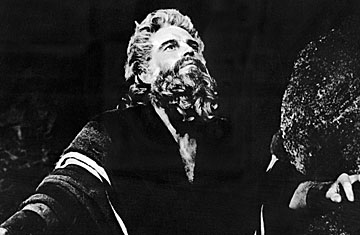
Charlton Heston as Moses in The Ten Commandments.
(2 of 3)
In a movie career that stretched from those student films, to a final appearance in 2003 as Nazi war criminal Joseph Mengele (hey, how'd that happen?), Heston would often venture beyond the epic. He made plenty of Westerns, some important science-fiction films, a few comedies (for which he was constitutionally unsuited). And he was willing to fight for directors he believed in. He assured the financing of Touch of Evil, Orson Welles' most satisfying post-Citizen Kane Hollywood film, by agreeing to star in it. He also offered to give back part of his salary so Sam Peckinpah could finish Major Dundee as he'd planned. (The story goes that the producers took the money but didn't allow the extra shooting. Even if it's not true, it's certainly Hollywood.)
But when a guy like Heston — and, really, there was no guy like Heston — walks onto a set, people line up to put him in majestic roles. Cecil B. De Mille saw his appeal immediately, casting him as the circus owner in the Oscar-winning The Greatest Show on Earth, then giving him the 31-year-old the role of Moses, where Heston, with an old man's beard and a young athlete's energy, holds his staff above his head, parts the waters of the Red Sea and beckons the Israelites to walk on through. That last bit was a special effect, but Heston's Biblical authority was persuasively real. Moreover, The Ten Commandments was a huge hit, ensuring that other religious epics would be made. Heston starred in the biggest, Ben-Hur, which won a then-record 11 Oscars and was the top-grossing film of the decade.
As Judah Ben-Hur, Heston is still lean; he hasn't quite grown into the Greek physique he'd soon acquire. His thin face is dominated by a high, mile-wide brow, which made him a thinking-man hero — and, in his scenes with Stephen Boyd's Messala, Judah's boyhood friend and later deadly rival, startlingly intense. Gore Vidal, who worked on the script, said that the subtext was that the two men had once been lovers. Heston called that preposterous, but homoeroticism was potent in many epics of the time (oh, those Greeks; oh, them Romans!). Anyway, both actors clearly show a bond teetering between eros and agape, before it explodes into a more traditional male rivalry: a chariot race, the NASCAR tour of 29 A.D.
For all the excitement of that nine-minute horse race, Ben-Hur was long and logy. But with Heston now the go-to hero, it guaranteed that he'd be cast in his finest role: el Cid. In this Anthony Mann film, Rodrigo Diaz de Vivar is an 11th-century Spanish soldier who tempers force with wisdom, seeking a peace with the large local Islamic minority it is his job to subdue, and preaching moderation in the Court of King Ferdinand. Almost a pacifist warrior, he spends most of the film debating large issues with other beautiful people (Sophia Loren, John Fraser, Raf Vallone) — until the film's final battle, when, nearly dead, he orders that his body be strapped to his horse so that his presence will put fear into the enemy — a peerless metaphor for star quality. El Cid is one of those miracle movies: the ideal melding of a star at the top of his form in a genre at its most intelligent and enthralling.
The movies, TV and the stage never ran out of statesmen and supermen for Heston to play. He was Marc Antony (three times), Andrew Jackson (twice), Thomas Jefferson, Henry VIII, Cardinal Richelieu, Buffalo Bill. He did Macbeth on early live TV and Sir Thomas More in a small-screen revival of A Man for All Seasons. ( He wanted to play the role in the 1966 movie version, but lost out to Paul Scofield, who died last month.) Having cut his great white teeth on Broadway, Heston was the rare mid-century movie star who returned to the stage. Laurence Olivier directed him in The Tumbler, the year after Ben-Hur. He did Long Day's Journey Into Night with Deborah Kerr and Macbeth with Vanessa Redgrave.In 1999 he and his wife, Lydia Clarke, read the Love Letters play in London.
MOSES IN DYSTOPIA
And when he wasn't at home in the past, he was a voyager into the future. For a while in the late 60s and early 70s, Heston owned the upscale science fiction genre. As the stranded astronaut on the Planet of the Apes, he was the ultimate loner: the only member of his species in a world ruled by monkeys. Heston had caught a cold on the shoot, but director Franklin Schaffner insisted they keep filming, because the new gruffness in the star's voice lent a desperate urgency to his lines, from his first words to the simian overlords ("Take your stinking paws off me, you damned dirty ape!") to his final curse of Planet Earth ("God damn you all to hell!"). Since we've established that Heston was a deity, he could as easily have said, "I damn you all to hell!"
